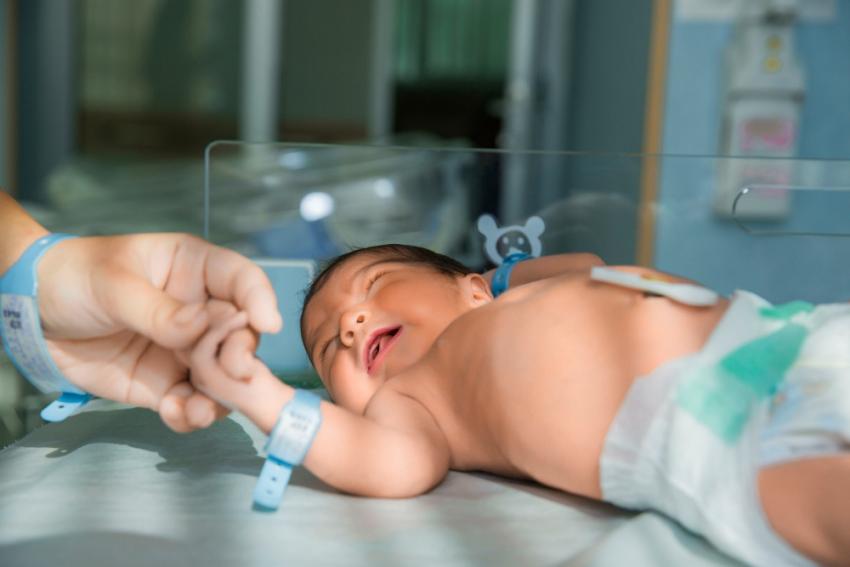
Taking your newborn for circumcision and bringing them back home is an exciting once in a life time experience. It remains memorable throughout your life. While this common procedure is generally safe and highly practiced, proper aftercare is very important to ensure healing and to prevent complications. As a parent, it's not just overwhelming but also a very anxious task knowing what to expect and how to care for your little one for his smooth recovery.
Circumcision is the process where it involves the removal of foreskin from the penis, leaving a small wound that needs time to heal.The tip of the penis may appear red, swollen, or slightly bruised immediately after the procedure but this is very normal. You can also expect yellowish-white film or small amount of bleeding in the first few days, which is part of the natural healing process.
Most babies heal within 7 to 10 days, but proper care is crucial to avoid infection and discomfort. Here’s what you need to know to keep your baby comfortable and support healing. Let's discuss it one by one :-
1. Maintain Proper Hygiene
Keep the area clean by gently cleaning the penis with warm water during diaper changes and also most importantly avoid using soap, wipes, or rubbing alcohol while cleaning as these can irritate the sensitive skin and can cause burning sensations.
If the doctor applied a protective dressing like petroleum jelly and gauze, follow their instructions on when and how to remove it. Some dressings fall off on their own within a day or two.
2. Follow Pediatricians Instructions
Most pediatricians recommend applying a thin layer of petroleum jelly like:Vaseline to the tip of the penis with each diaper change. This prevents the wound from sticking to the diaper and reduces friction.
If a Plastibell-a plastic ring was used by the pediatrician, it should fall off on its own within 5 to 10 days.Do not try to remove it manually.
3. Change Diapers Frequently
Wet or soiled diapers can irritate the healing area, and cause discomfort to the baby, so change them as soon as possible to keep the penis clean and dry. It will also help in preventing infection.
Also fasten the diaper loosely to avoid unnecessary pressure on the wound. You can also size up your diapers from the regular ones temporarily for extra comfort for your baby.
4. Watch for Signs of Infection
While mild redness and swelling are normal, contact your pediatrician immediately if you notice any of the mentioned signs like increased swelling, pus, or foul-smelling discharge.
A few drops are normal, but continuous bleeding is not and seeks for immediate attention.
Fever 100.4°F or higher with No improvement after a week
5. Few Comfort Measures
If your baby seems to have unbearable pain and is very uncomfortable, ask your doctor about giving infant acetaminophen (Tylenol) in the appropriate dose which can help in pain relief.
Avoid unnecessary pressure on the diaper area when holding or dressing your baby. And gently hold the baby.
Caress with some extra cuddles and breastfeed your baby to soothe him during recovery.
Don'ts
Don’t pull on any remaining skin or try to clean aggressively.
Avoid bathtubs until the penis is fully healed. Practice sponge baths instead these are safer in the first week.
Skip tight clothing that could rub against the healing area.
Call the Doctor if the Plastibell hasn’t fallen off after 10-12 days. The redness spreads or worsens. Your baby cries excessively or refuses to feed, which could indicate pain or infection. Most babies heal without issues, but seek medical advice for the mentioned signs.
Let’s be honest – seeing your tiny baby with a healing circumcision can pull at your heartstrings. Those first few diaper changes might make you nervous, and that’s completely normal. As one mom told us, "I treated those first post-circ diapers like I was handling rare artifacts!"
While this guide covers the essentials, every baby heals differently. Some bounce back immediately (seriously, some barely seem to notice!), while others need extra comfort measures. That’s where a circumcision specialist or your pediatrician becomes your best resource – don’t ever hesitate to call them about what seems like a silly question. As one dad shared, "I must’ve sent our nurse five photos of ‘is this normal?’ in the first week!"
Remember, you’re not just caring for a medical site – you’re comforting your precious little one. The extra snuggles, the gentle diaper changes, the way you learn to carefully apply that petroleum jelly (pro tip: warm it between your fingers first!) – this is parenting in action.
Before you know it, this will just be another story in your parenting journey. And when friends ask you for advice down the road? You’ll be the wise one saying, "Here’s what worked for us… but definitely check with your circumcision specialist too!"
P.S. Still feeling unsure? That’s what your medical team is for! Even experienced circumcision specialists would rather answer a hundred "silly" questions than have one worried parent struggling alone.




